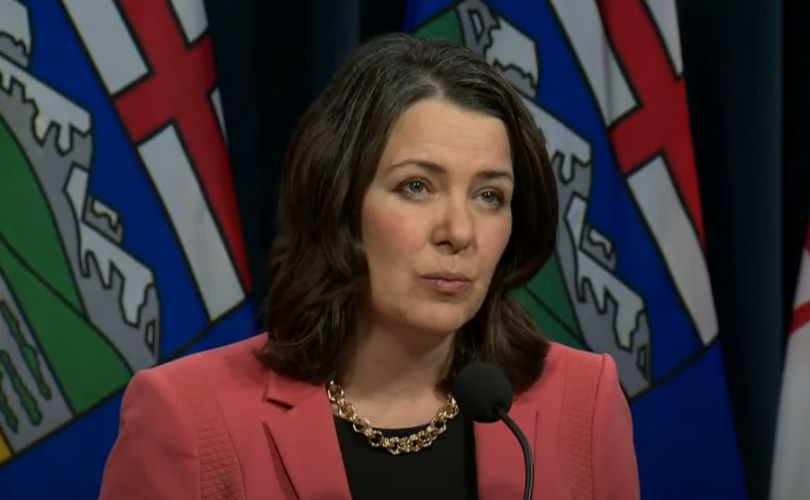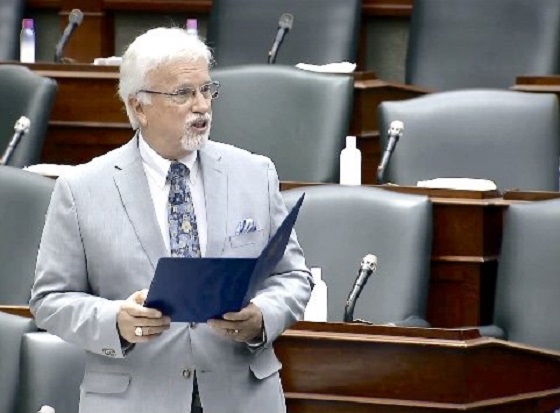Alberta
Orange Shirt Day is time to end racism against Indigenous Peoples

Minister Wilson and Minister of Culture, Multiculturalism and Status of Women Leela Aheer join Albertans in recognizing Orange Shirt Day in their orange shirts.
From the Province of Alberta
Minister of Indigenous Relations Rick Wilson issued the following statement about Orange Shirt Day:
“About 12,000 residential school survivors and their families live in Alberta. They are our friends and our neighbours. For generations, they have carried with them trauma of being pulled from their families, punished for speaking their languages and, far too often, abused at the hands of their caretakers.
“For as long as they have carried that pain, they have shown the will to overcome it. Unfortunately, Indigenous Peoples still face racism and misunderstanding.
“The time to end that is now. Each year on Sept. 30, we put on orange shirts to honour survivors’ experiences and to acknowledge that tragic past. Each one of us bears a responsibility to support safe and inclusive environments for generations of children to come.
“I am proud to be part of a government that is taking a stand and delivering on that promise by working every day to create more inclusive experiences for Indigenous students in Alberta.
“Today, I declare Orange Shirt Day in Alberta. It is a day to stand with Indigenous people by wearing orange and talking about our responsibility to past, present and future generations. I encourage you to join people across the province by wearing orange and talking about reconciliation. We have the power as strong and free Albertans to practise tolerance and understanding this day and throughout the year.”
Alberta
Alberta threatens to fight Trudeau government restrictions on Canada’s plastics industry

From LifeSiteNews
“If the federal government refuses to abide by the constitution, we will take them to court again to defend our jurisdiction and the thousands of Albertans who work in the petrochemical sector”
Alberta has rejected the Liberal government’s “unconstitutional” federal plastics registry and production limit.
In an April 25 press release, Alberta’s Environment Minister Rebecca Schulz promised to take Liberal Minister of Environment and Climate Change Steven Guilbeault to court over his proposal to create a plastics registry, mandating companies to report their plastic production and implementation.
“If the federal government refuses to abide by the constitution, we will take them to court again to defend our jurisdiction and the thousands of Albertans who work in the petrochemical sector,” Schulz declared.
“This unilateral announcement is a slap in the face to Alberta and our province’s petrochemical industry, and the thousands of Albertans who work in it,” she continued.
Guilbeault’s plan, set to be implemented in September 2025, would mandate that businesses record how much plastic they place on the market in addition to the amount of plastic waste generated on their commercial, industrial, and institutional premises.
Companies would then report that amount to the federal government. The plan exempts small businesses which produce less than one tonne of plastic each year.
However, Schulz explained that the registry would negatively affect Alberta, as “plastics production is a growing part of Alberta’s economy, and we are positioned to lead the world for decades to come in the production of carbon neutral plastics.”
“Minister Guilbeault’s proposal would throw all of that into jeopardy and risk billions of dollars in investments. This includes projects like Dow Chemical’s net-zero petrochemical plant in Fort Saskatchewan, a $9-billion project that will create thousands of jobs,” she warned.
Schulz further pointed out that the mandate will not reduce plastic production since countries such as China will produce more plastic to make up for Canada.
“If the federal government limits plastic production in Canada, other countries like China will just produce more. The only outcome that this federal government will achieve will be fewer jobs in Canada,” she explained.
Schulz’s statement comes after the November decision by the Federal Court to rule in favor of Alberta and Saskatchewan, declaring that Prime Minister Justin Trudeau’s government overstepped its authority by classifying plastic as “toxic” and banning all single-use plastic items, like straws.
Essentially, the ruling overturned Trudeau’s 2022 law which outlawed manufacturing or importing plastic straws, cutlery, and checkout bags on the grounds of government claims that plastic was having a negative effect on the oceans. In reality, most plastic pollution in the oceans comes from a few countries, like India and China, which dump waste directly on beaches or in rivers.
The November ruling was only one of two recent court rulings that have dealt a blow to Trudeau’s environmental laws.
The second ruling came after Canada’s Supreme Court recently sided in favor of provincial autonomy when it comes to natural resources. The Supreme Court recently ruled that Trudeau’s law C-69, dubbed the “no-more pipelines” bill, is “mostly unconstitutional.” This was a huge win for Alberta and Saskatchewan, which challenged the law in court. The decision returned authority over the pipelines to provincial governments, meaning oil and gas projects headed up by the provinces should be allowed to proceed without federal intrusion.
The Trudeau government, however, seems insistent on defying the recent rulings by pushing forward with its various regulations.
Alberta
Alberta government should eliminate corporate welfare to generate benefits for Albertans

From the Fraser Institute
By Spencer Gudewill and Tegan Hill
Last November, Premier Danielle Smith announced that her government will give up to $1.8 billion in subsidies to Dow Chemicals, which plans to expand a petrochemical project northeast of Edmonton. In other words, $1.8 billion in corporate welfare.
And this is just one example of corporate welfare paid for by Albertans.
According to a recent study published by the Fraser Institute, from 2007 to 2021, the latest year of available data, the Alberta government spent $31.0 billion (inflation-adjusted) on subsidies (a.k.a. corporate welfare) to select firms and businesses, purportedly to help Albertans. And this number excludes other forms of government handouts such as loan guarantees, direct investment and regulatory or tax privileges for particular firms and industries. So the total cost of corporate welfare in Alberta is likely much higher.
Why should Albertans care?
First off, there’s little evidence that corporate welfare generates widespread economic growth or jobs. In fact, evidence suggests the contrary—that subsidies result in a net loss to the economy by shifting resources to less productive sectors or locations (what economists call the “substitution effect”) and/or by keeping businesses alive that are otherwise economically unviable (i.e. “zombie companies”). This misallocation of resources leads to a less efficient, less productive and less prosperous Alberta.
And there are other costs to corporate welfare.
For example, between 2007 and 2019 (the latest year of pre-COVID data), every year on average the Alberta government spent 35 cents (out of every dollar of business income tax revenue it collected) on corporate welfare. Given that workers bear the burden of more than half of any business income tax indirectly through lower wages, if the government reduced business income taxes rather than spend money on corporate welfare, workers could benefit.
Moreover, Premier Smith failed in last month’s provincial budget to provide promised personal income tax relief and create a lower tax bracket for incomes below $60,000 to provide $760 in annual savings for Albertans (on average). But in 2019, after adjusting for inflation, the Alberta government spent $2.4 billion on corporate welfare—equivalent to $1,034 per tax filer. Clearly, instead of subsidizing select businesses, the Smith government could have kept its promise to lower personal income taxes.
Finally, there’s the Heritage Fund, which the Alberta government created almost 50 years ago to save a share of the province’s resource wealth for the future.
In her 2024 budget, Premier Smith earmarked $2.0 billion for the Heritage Fund this fiscal year—almost the exact amount spent on corporate welfare each year (on average) between 2007 and 2019. Put another way, the Alberta government could save twice as much in the Heritage Fund in 2024/25 if it ended corporate welfare, which would help Premier Smith keep her promise to build up the Heritage Fund to between $250 billion and $400 billion by 2050.
By eliminating corporate welfare, the Smith government can create fiscal room to reduce personal and business income taxes, or save more in the Heritage Fund. Any of these options will benefit Albertans far more than wasteful billion-dollar subsidies to favoured firms.
Authors:
-

 Business16 hours ago
Business16 hours agoUN plastics plans are unscientific and unrealistic
-

 Brownstone Institute19 hours ago
Brownstone Institute19 hours agoThe Teams Are Set for World War III
-

 Education14 hours ago
Education14 hours agoSupport a young reader through the Tim Hortons Smile Cookie campaign
-

 Alberta5 hours ago
Alberta5 hours agoAlberta threatens to fight Trudeau government restrictions on Canada’s plastics industry
-

 Opinion17 hours ago
Opinion17 hours agoThe Climate-Alarmist Movement Has A Big PR Problem On Its Hands
-

 Automotive4 hours ago
Automotive4 hours agoCanadian interest in electric vehicles falls for second year in a row: survey
-

 COVID-192 hours ago
COVID-192 hours agoFormer Canadian lawmaker has no regrets about refusing COVID shot despite losing his job
-

 Fraser Institute6 hours ago
Fraser Institute6 hours agoFederal government’s fiscal record—one for the history books




